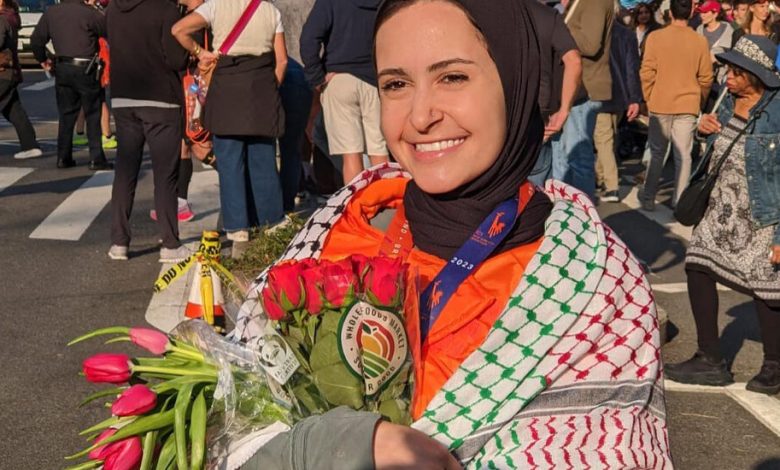Muslim Runner Says She Was Cut From Lululemon Campaign Over Religious Identity

An Arab-American runner who competed in the New York City Marathon said she was cropped out of a Lululemon media campaign because of her identity and support for Palestinians in the Israel-Gaza war.
Amena Saad said in a statement that at the beginning of October she participated in a photo shoot to promote the marathon through the noname program, a marathon training program sponsored by the athletic apparel retailer Lululemon. Once the images were shared with members of the program, she realized she had been cropped out of “every image without explanation,” she wrote on Instagram.
“My interpretation is that my visible identity as a Muslim woman isn’t a convenient association of Lululemon in the context of the politicized genocide in Gaza and the anti-Arab, anti-Muslim backlash and bias” that has spread across the United States, wrote Ms. Saad, who wears a hijab.
“It isn’t that I care to be featured in their content,” she continued. “It’s that I won’t allow my identity to be put on display when it’s valuable for the brand and erased when it’s a liability.”
The images, which she included in her post, show a sliver of Ms. Saad’s face and arm, which is the only one covered with a long sleeve, for religious reasons. Ms. Saad posted the cropped photos along with her statement, which said she would no longer associate with Lululemon “in any capacity.”
In a statement to The New York Times, a spokesman for Lululemon said the company did not intend to exclude anyone from the photographs.
“We received incorrect information that Ms. Saad did not want to be included in the photos, and we have since reached out to her directly to apologize for our mistake,” the statement said. “Lululemon is committed to fostering an inclusive, diverse and welcoming environment, and we will continue to work to improve and advance our efforts going forward.”
The company assumed she did not want to participate because of safety concerns, but Ms. Saad said she had never expressed feeling unsafe.
The images were sent to the runners who appeared in the photo shoot but were not used by Lululemon or noname, the spokesman said. Ms. Saad said she saw them in a group chat with other leaders in the program and noticed she was the only one from the shoot cropped out of all the photos.
In an email reviewed by The Times, Lululemon apologized to Ms. Saad for the delay in getting back to her and acknowledged the mistake in not speaking with her directly about appearing in the photos.
Corporations have been under scrutiny for what they say publicly and to their employees since the war began last month, and many have penalized employees for posting online what they consider inflammatory statements.
Many Muslims, Arabs and supporters of Palestinians have said they should be free to call for a cease-fire online and voice their support for people on the ground in Gaza, pointing to rising anti-Muslim sentiment. According to the Palestinian Ministry of Health in Hamas-controlled Gaza, Israeli strikes have killed more than 11,000 people in the territory. But critics have said that some of the rhetoric used by pro-Palestinian movements has minimized the suffering of Israeli Jews in the wake of the Hamas attack in Israel that killed about 1,200 people and has contributed to growing anti-Semitism.
Ms. Saad’s previous Instagram posts and stories have included links to fund-raisers for Palestinians and a page calling for a boycott of Boeing over materials it provided to Israeli forces. Her profile also links to a website called “DecolonizePalestine.”
Edward Ahmed Mitchell, the national deputy director for the Council on American-Islamic Relations, said in a statement to The Times that if what happened to Ms. Saad were true, “it would represent only the latest brazen act of anti-Muslim and anti-Palestinian bigotry that we have witnessed.”
Ms. Saad, who ran her first marathon in London in April, ran the New York City Marathon with the New York City Muslim Running Club and finished at 3 hours 59 minutes and 20 seconds. She wore the Palestinian flag pinned above her heart.
In a separate statement to The Times, Ms. Saad said running had long been a passion of hers and “a vehicle for seeking out and building community” in New York City, where she lives. That included being a team leader for the noname program, leading the 8-minute-30 second-mile group.
“A big part of what was attractive about the noname program was its emphasis on inclusivity and embracing people’s full identities and experiences,” she wrote. “That’s why I felt so blindsided when I discovered that I had been cut out of the photos without any notice or communication.”
Ms. Saad said she pointed out the exclusion to Lululemon’s diversity, equity and inclusion team, and was not given “a clear or convincing explanation for my erasure from the campaign,” she said.
“For that to happen at the same time as this burgeoning anti-Arab and anti-Muslim sentiment made me feel both disappointed and deceived,” she wrote.
Noor Abukaram, a runner who was told she couldn’t run in her hijab in high school and pushed back, criticized Lululemon’s decision to leave out Ms. Saad.
“The timing is terrible,” she said. “If you’re a brand that’s representing sport, including our beautiful sport of running, then you should do it with the most integrity and with the most clear objective of why you’re doing this campaign.”
Ms. Abukaram said running has provided an outlet during the war.
“A lot of people might feel guilty to go for a run at a time like this when children are dying,” she said, but running has given her the chance to be “one with myself, my emotions and channel it into positive energy.”
